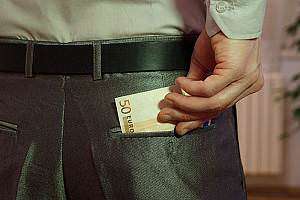Abolish Cash? Hell No, Says German Economist. Notes and Coins Are 'Printed Freedom.'
Evading state control is a feature, not a bug

The other day I mentioned a proposal by German government economic advisor Peter Bofinger to abolish cash, because the anonymous stuff makes it too easy for people to escape the oh-so good intentions of central banks, regulators, and tax collectors. It turns out his scheme sparked not just a wide-ranging international discussion, but an immediate, and very strong, reaction from one of his colleagues. According to Deutsche Welle:
But German economist Bofinger's hope that paper money will soon be a thing of the past was immediately contested by Freiburg-based economist Lars Feld, who said that banknotes are pieces of "printed freedom" that citizens were entitled to - because they should be entitled to an escape from all-out state control.
Feld's opinion on this point matters because he is also an economic advisor to the German government. His official quote in that capacity suggests just a tad more respect for individual autonomy than Bofinger offers. "In a liberal society and economy, control lies ideally with sovereign citizens in the political arena and sovereign consumers in the economic arena. The interests of the citizens are the only legitimate source for decisions taken on the political stage."
In the past, I've cited Feld's work on Swiss tax evasion rates and the role that "tax morale" plays in deterring people from hiding their money. Basically, if people are relatively pleased with the system, they'll pay more than you'd expect by looking at enforcement efforts; if they get pissed at the powers that be, all bets are off.
The Deutsche Welle piece goes on to note that much of Scandinavia appears to be moving away from cash for reasons of its own that are largely matters of popular choice. But abolishing cash as a top-down policy preference is a different matter.
Unilaterally starting such a system would no doubt be risky, as another nation's paper currency might gain popularity within countries that abolish their own paper currency, says Kenneth Rogoff [a Harvard economist who also wants to be rid of the stuff]. Hence, he concludes, "any attempt to eliminate large-denomination currency would ideally be taken up in a treaty to include, at the vey least, the major global currencies."
I wonder what the tax morale effects of trying to stuff the abolition of cash down the throats of the public would be?


Show Comments (62)